

Experiencing a motorcycle accident can be a traumatic event, often leaving riders in a state of confusion and shock. The moments following the incident are crucial, as they can significantly impact your health and any potential legal claims that may arise. Understanding the appropriate steps to take in the immediate aftermath is essential for ensuring your safety and protecting your rights.
First and foremost, the priority should be your emergency response. Assess your injuries and the condition of others involved, then call for help if needed. It is important to stay calm and avoid moving unless there is an imminent danger, such as oncoming traffic. Ensuring that all parties are safe and that proper authorities are notified is the foundation for addressing the situation effectively.
Once you have ensured safety and medical assistance is on the way, it becomes vital to document the scene. Gather evidence, take photographs, and collect information from witnesses, as this documentation can be valuable for insurance claims and potential legal proceedings. Keeping a clear record of details can greatly assist in establishing fault and demonstrating the severity of the accident.
Immediate Actions to Ensure Safety and Health

After a motorcycle accident, the first priority is ensuring safety for yourself and others involved. Here are essential steps to take immediately:
Check for Injuries: Assess your own condition and that of your passengers. If you or anyone else is injured, avoid moving unless there is an immediate danger. Staying still can help prevent further injury.
Move to Safety: If it is safe to do so, move your motorcycle and yourself away from traffic to prevent additional accidents. Turn on your hazard lights to alert other drivers.
Call for Help: Dial emergency services to report the accident. Provide them with details such as location and severity of injuries. Assist your passengers in making the call if needed.
Do Not Admit Fault: During initial conversations, avoid discussing the accident’s cause. Admissions of fault can complicate insurance claims and legal matters. Stick to the facts when providing information.
Document the Scene: If possible, take photos of the accident site, vehicle damages, and any injuries. These visuals can be crucial for insurance claims and legal proceedings.
Seek Medical Attention: Even if you feel fine, seek a medical evaluation. Some injuries may not be immediately apparent but can have serious consequences if left untreated.
Notify Your Insurance: Inform your insurance company about the accident as soon as possible. Provide them with the necessary documentation and details to facilitate the claims process.
Follow-Up Care: After receiving medical attention, follow your doctor’s recommendations for treatment and recovery. Keep records of all medical visits and expenses related to the accident.
By taking these steps immediately after an accident, you can help ensure your safety and health, while also laying the groundwork for any necessary claims or legal actions.
Documenting the Accident: What Information to Collect
After a motorcycle accident, it is crucial to document the incident thoroughly. Collecting the right information can aid in insurance claims and potential legal proceedings. Start by gathering basic details of the accident.
1. Exchange Information: Obtain the names, addresses, phone numbers, and insurance information of all parties involved in the accident. This includes drivers, passengers, and any witnesses. If emergency services were called, note their badge numbers and department contact information.
2. Record the Scene: Take clear photographs of the accident scene from multiple angles. Include shots of vehicle damages, road conditions, and relevant traffic signs. This visual evidence can be integral when explaining the circumstances that led to the accident.
3. Write Down Your Account: Document your own recollection of the accident while it’s still fresh in your mind. Note the date, time, weather conditions, and circumstances leading up to the incident. Be as detailed as possible to create a comprehensive account.
4. Collect Witness Statements: If there are witnesses, ask them for their account of the accident. Their observations can differ from yours or others involved, providing additional context to the incident.
5. Seek Medical Attention: Even if injuries seem minor, get medical help. Emergency personnel can document injuries in their reports, which is essential for any future claims. Keep copies of all medical records and treatment plans related to the accident.
6. File a Police Report: If law enforcement arrives at the scene, make sure to get a copy of the police report, which will include critical details and may establish fault. This can be valuable in resolving disputes later.
Thorough documentation not only assists in navigating the immediate aftermath of an accident but also lays the groundwork for ensuring your rights are protected in the long run.
Understanding Your Rights and Next Steps for Claims

After a motorcycle accident, it is crucial to understand your rights and the necessary steps for filing claims. First and foremost, ensure that you have received medical attention for any injuries. If you have not done so, contacting emergency services should be your initial action. Your health and safety are paramount.
Once you have addressed any immediate medical concerns, gather critical information related to the accident. Document the scene thoroughly, including photographs, witness statements, and any other relevant details. This documentation is vital when supporting your claim and can substantiate your account of the events.
You have the right to seek compensation for damages resulting from the accident, including medical expenses, lost wages, and pain and suffering. It is advisable to consult with a personal injury attorney specializing in motorcycle accidents. They can provide expert guidance on navigating the claim process and help you understand your rights regarding insurance settlements.
Notify your insurance provider about the accident as soon as possible. Be prepared to provide them with all the documentation you collected. Remember to avoid discussing details of the accident with the other party’s insurance company without legal representation, as this could potentially jeopardize your claim.
In conclusion, understanding your rights and knowing the steps to take after an accident is essential for securing fair compensation. Prioritize your recovery, gather necessary documentation, consult with legal experts, and communicate with your insurance provider to ensure that your rights are protected throughout the claims process.
